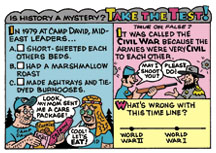|
May 16, 2001: On the Campus
Ignorance of history is common, even at Princeton by Alex Rawson '01 A year ago, the American
Council of Trustees and Alumni (ACTA) issued a report condemning
the “historical illiteracy” of college students, claiming
that today’s college seniors had barely better than 50 percent
knowledge of high-school level American history. The organization
surveyed 556 seniors at the top 55 American liberal arts colleges
and major universities, asking 34 basic history questions, and found
that the average score was a disturbing 53 percent. For the following
Fourth of July weekend, the New York Times picked up the story with
patriotic alarm, printing the survey and an explanation that the
uninformed students included some at Harvard, Princeton, and Brown.
I clipped the article, vowing to test the survey at Princeton and
hoping to clear Princeton of the charge of historical ignorance.
Nine months later, after
surveying 43 students from all four classes and from a wide range
of academic departments, these are my highly informal (and admittedly
statistically invalid) findings. The good news is that we appear
better than the national average, correctly answering an average
of 73 percent of the questions (25 out of 34); the bad news is that
although we are better than most, all is still not right. The lowest
score was an embarrassing 15 out of 34, another student correctly
answered only 16 questions, and several other students were clustered
nearby. But what is most interesting is what exactly we did not
know. Fourteen students —
nearly a third — did not know that the Federalist Papers had
been intended to gain ratification of the U.S. Constitution; another
nine failed to identify the Constitution as the document that established
the division of powers between the states and the federal government.
Sixteen students could not connect John Marshall with Marbury v.
Madison, and the same number could not identify George Washington
as the American general at Yorktown — particularly astonishing
given that none of the other choices (Sherman, Grant, and MacArthur)
were even alive during the American Revolution. Eight students incorrectly
thought that Lincoln had been president between 1840 and 1860. More
than half of those surveyed picked Jefferson rather than James Madison
as the “Father of the Constitution.” And in some ways
most embarrassingly, five students, while well in the minority,
could not identify John Adams as the second president of the U.S.,
or Italy and Japan as Germany’s allies during World War II.
All of these questions are central to American history, and many,
particularly those about the Constitution, are crucial background
to understanding American citizenship. Civic participation depends
to some extent on knowledge of the founding principles of the Republic,
and therefore the results of this survey raise questions about the
structure of higher education today. Some would argue that in this
technologically driven age the concept of the liberal arts education
is obsolete. If we believe that, then this history survey does not
matter. If, on the other hand, we believe that the purpose of higher
education is at least in part to develop an informed citizenry,
then the concept of a liberal arts education is not obsolete at
all. In that case, liberal arts institutions across the country,
Princeton included, need to do a better job of teaching American
history to all students. Princeton requires that
students take only one “historical analysis” course before
graduating. It does not even have to be a course in the history
department, and it certainly does not have to cover American history.
But perhaps it should. Why not require two history classes, one
of them American and one of them not? In this era of globalization,
that can be a difficult argument to make — but global understanding
should build on rather than replace national identity. We cannot
afford to lose sight of our own heritage, because our place in the
world is based upon it. But if the history survey is right, we are
in danger, even at Princeton, of misplacing at least part of that
heritage —and are therefore in danger of forgetting what our
role in the world has been and can be. Alex Rawson (ahrawson@princeton.edu)
is a history major who wrote his thesis on Abraham Lincoln. Looking for more student perspective? Find it at On the Campus Online
|
||

 Condemned
to repeat it
Condemned
to repeat it